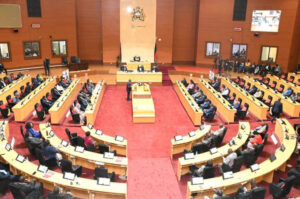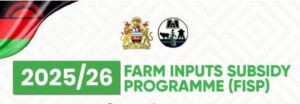

Minister Joseph Mwanamveka to present the budget review in the august House on November 21
* The mid-year budget review is an opportunity for Malawi to reset its fiscal direction, especially at a time when the economy is grappling with high inflation, rising debt-service obligations, exchange-rate volatility, and persistent structural bottlenecks
* Malawi needs a realistic fiscal path that reins in expenditure overruns, strengthens revenue performance, protects vulnerable households, and unlocks private-sector-led growth
By Duncan Mlanjira
As Minister of Finance, Joseph Mwanamveka prepares to present the 2025 Mid-Year Budget Statement to Parliament on November 21, Chief Economist for Don Consultancy Group (DCG), Chifipa Mhango advises that the review “must strike a careful balance between restoring fiscal discipline, addressing cost-of-living pressures, and laying the foundation for long-term economic transformation”.

Advertisement
Mhango adds that the mid-year budget review “is an opportunity for Malawi to reset its fiscal direction, especially at a time when the economy is grappling with high inflation, rising debt-service obligations, exchange-rate volatility, and persistent structural bottlenecks”.
“The mid-year budget must provide clarity, credibility, and concrete reforms,” he says in a statement from Johannesburg, South Africa. “Malawi needs a realistic fiscal path that reins in expenditure overruns, strengthens revenue performance, protects vulnerable households, and unlocks private-sector-led growth.
“This is a pivotal moment to restore economic confidence. Malawi must urgently restore fiscal discipline if it is to avoid deeper macroeconomic instability. Tightening government spending, improving debt transparency, and prioritising concessional borrowing are essential steps to stop rising debt from crowding out development spending.

Chifipa Mhango
The Chief Economist further maintains the “fiscal consolidation is unavoidable” — while warning that “without stabilising debt and enhancing credibility with development partners, Malawi risks deepening macroeconomic instability”.
“A stable and predictable Kwacha is Malawi’s first line of defence against inflation. The Government must strengthen foreign-exchange management through the Reserve Bank of Malawi (RBM), boost export competitiveness — especially in agriculture and mining — and improve forex retention through incentivising formal market participation to rebuild investor confidence and bring price pressures under control.
“A stable and predictable exchange-rate environment is essential for controlling inflation, attracting investment, and rebuilding private-sector confidence.
“Agriculture is Malawi’s most powerful engine for inclusive growth — but it must move beyond subsistence. Reforming the affordable input programme (AIP) to reduce inefficiencies, investing in irrigation and storage, and expanding agro-processing, are critical to boosting productivity and ensuring long-term food security; as well as strengthening extension services and farmer financing.”

AIP has been reverted to FISP
Mhango emphasises that agriculture remains the country’s engine for inclusive growth and thus “the budget must pivot toward commercialisation, not just consumption subsidies”.
He also touches on energy, saying: “Reliable energy and modern infrastructure are the backbone of economic transformation. Malawi cannot industrialise or attract large-scale investment without accelerating power generation and transmission projects, supporting independent power producers through regulatory clarity, and building efficient road and logistics systems to reduce transport costs.
“Reliable energy and modern infrastructure are the backbone of industrialisation. Malawi cannot grow without resolving these structural bottlenecks.

Malawi relies heavily on hydro energy
“With inflation eroding household incomes, social protection must be strengthened — without compromising fiscal discipline. Well-targeted cash transfers programmes and support to vulnerable households impacted by food and fuel inflation are essential to cushioning citizens while broader economic reforms take shape while ensure social programs are efficiently targeted and free of leakages.”
Mhango further argues that the country’s economic turnaround “depends on a vibrant private sector [and that] reducing regulatory barriers and streamline business registration; modernising or reforming land governance, trade facilitation and tax systems; and scaling up public-private partnerships — will be key to unlocking investment and driving sustainable growth”.
“Reform momentum must accelerate. If Malawi aligns its mid-year budget to fiscal stability and deep structural reforms, the country can achieve lower inflation, stronger investor confidence, and faster agricultural and industrial growth, improved creditworthiness with multilateral lenders, greater resilience to external shocks, and strengthened social protection for the most vulnerable.”

Advertisement
Without decisive action, the Chief Economist believes that Malawi “risks renewed currency depreciation, rising inflation and food insecurity, deeper debt distress, and declining donor confidence as well as pressure on foreign reserves”.
“This mid-year budget is a critical opportunity to reset the economy’s trajectory. Malawi stands at an economic crossroads. It must send a strong signal that Malawi is committed to stability, reform, and inclusive growth.
“With disciplined implementation, the country can rebuild confidence, attract investment, and place the economy on a sustainable recovery path,” concludes Mhango, who is also DCG’s director of economic research & strategy.



Advertisement
